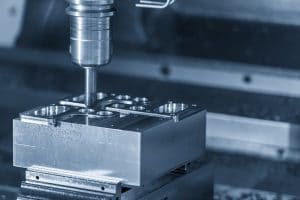 Heat exchanger technology has proven to be one of the biggest innovations in electrical thermal management over the last few decades. From it, several other innovative, custom thermal solutions have also been developed and become as popular and beneficial as more conventional heat exchangers. For example, in the molding industry, the process of cooling molds and facilitating faster, more efficient machine tool cooling is an essential advantage. With the implementation of custom thermal pins, which are specialized heat exchangers designed specifically for molding equipment, companies can achieve these and many other advantages safely and with minimal costs.
Heat exchanger technology has proven to be one of the biggest innovations in electrical thermal management over the last few decades. From it, several other innovative, custom thermal solutions have also been developed and become as popular and beneficial as more conventional heat exchangers. For example, in the molding industry, the process of cooling molds and facilitating faster, more efficient machine tool cooling is an essential advantage. With the implementation of custom thermal pins, which are specialized heat exchangers designed specifically for molding equipment, companies can achieve these and many other advantages safely and with minimal costs.
Important heat transfer innovations
The secret to how heat exchangers streamline thermal management is simplicity. For instance, the goal of electrical thermal management is to prevent the sensitive components within electrical enclosures from overheating. The way these components generate waste heat may be complex, and dealing with that waste heat within a small enclosed structure can be challenging. However, it doesn’t have to be complicated; rather than generating chilled air to fight the waste heat, heat exchangers utilize cooling fluid to absorb and transfer it safely away. This not only minimizes the amount of equipment needed for thermal management, but also the amount of energy that companies have to invest in to keep their cooling solutions operational.
Heat transfer for more than electrical cooling
Traditionally, heat exchangers gained popularity for their ability to efficiently keep electrical enclosures properly cooled. Now, however, thermal management hasn’t several different implications for companies in virtually every industry, and the benefits that simplified heat transfer concepts offer are much more impactful. In the molding industry, for example, thermal management is the basis of production. Heat must be rapidly removed from every mold in a consistent and even manner, and the rate at which a company can achieve this while maintaining the quality of each mold largely determines their overall productivity. Thermal pins apply the high-performance, low-maintenance heat transfer capabilities of heat exchangers to the highly specialized molding equipment that companies rely on.
What thermal pins do for the molding industry
Customizing their equipment with specialized thermal pins have granted companies in the molding industry a wide range of benefits. Most notably, machine tool cooling becomes much more reliable and efficient, with faster yield times and more consistent high-quality finishes. The improved productivity has led to significant gains both in profit and reputation, as companies become known for quickly and consistently producing high-quality molds. Because thermal pins are based on heat exchanger technology, they also don’t require large amounts of energy to operate, helping companies lower their overall operational costs.
For more information about thermal pins for machine tool cooling in the molding industry, call Noren Thermal Solutions in Taylor, TX, at 866-936-6736.







